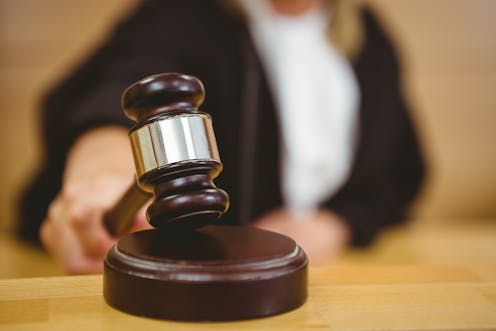New laws help juries understand why victims of sexual violence struggle to recall their assaults
- Written by Cindy Grahame, PhD candidate, University of Newcastle

In June, the New South Wales parliament passed new laws to strengthen protection for children from sexual abuse and enact harsher sentences for their abusers.
The reformed laws were in response to the recommendations of the final report by the Royal Commission into Institutional Responses to Child Sexual Abuse, handed down in December 2017.
One of the most significant changes to the NSW laws is in the directions that judges are permitted to give to a jury – one that could impact how victims of sexual assault are viewed by juries.
In a meaningful shift, the amendment allows the trial judge to explain to the jury that it is common for both child and adult victims of sexual assault to forget the details of the trauma they have endured.
Read more: Rape, sexual assault and sexual harassment: what’s the difference?
The judge may also tell the jury it is common for there to be differences in the retelling of accounts of sexual assaults. The judge can explain that trauma affects people differently, including their recall of events. And this could result in differences between pre-court statements and what victims say during a trial.
The judge may also point out that both truthful and untruthful accounts of a sexual offence may contain differences.
It is up to jury members, therefore, to decide the relative importance of the differences in a complainant’s accounts when they are assessing his or her truthfulness and reliability.
However, there remains an important caveat to the revised laws: the new directions by the judges are entirely discretionary. This means that individual judges in individual sexual assault trials will decide whether to invoke the new provision.
The difficulties in prosecuting sexual assault cases
This provision is largely aimed at victims of childhood sexual abuse, as set out plainly in the act’s title . Royal Commission research found that victims of child sexual abuse often experience symptoms of post-traumatic stress disorder. This might include the inability to recall important aspects of the traumatic event.
These amendments may prove to be beneficial to women who are the victims of sexual offences, as well.
Read more: How music festivals can change the tune on sexual violence
Of sexual assaults of women reported to the police, prosecution rates remain stubbornly low: fewer than 50% of cases brought to court in NSW result in conviction. At the same time, reports of sexual assault in the state have increased by 12% in the last year, with women representing 82% of complainants. It is estimated that around 70% of all sexual assaults of women in NSW go unreported to the police.
Nationally, just 15% of alleged sexual assaults are reported to police, while only 11% of those incidents result in conviction.
There are complex reasons for this. Women report feelings of humiliation, denial and self-doubt following a sexual assault. They fear other people will disbelieve, shame and judge them. They also fear violations of their privacy throughout the legal process. Women who have pursued justice in the legal system describe it as arduous, combative and exhausting.
Precedent set in Victoria
New South Wales is not alone in its attempts to create more equitable trials for sexual abuse victims. In 2017, the Victorian parliament responded to an interim report by the Royal Commission into Institutional Responses to Child Sexual Abuse. This report found that in a sample study of sexual assault trials, defence lawyers raised inconsistencies in the complainant’s evidence in more than 90% of cases.
To address this, parliament amended the laws relating to the directions that judges are permitted to give to juries in sexual assault cases.
Read more: Hazing and sexual violence in Australian universities: we need to address men's cultures
The Victorian law later became the basis for the NSW provision. However, unlike in NSW, the Victorian statute is mandatory: if judges determine there are inconsistencies that would call into question a complainant’s credibility or reliability, they must direct the jury that this can be consistent with trauma.
Though mandatory, the onus is till on the judge to identify when such directions are needed. There appears to be only one reported case where a judge has done this in Victoria since the law was amended.
These new laws are important steps in the right direction to encourage the reporting of sexual crimes to the police and help juries understand why victims sometimes fail to recall certain aspects of the traumas they’ve endured.
Ensuring a fair trial for all parties to a criminal case is a paramount concern. These new laws go further than previous procedural changes in levelling the field for complainants in sexual assault cases. However, their efficacy will necessarily be limited by giving individual judges the discretion when to act.
Authors: Cindy Grahame, PhD candidate, University of Newcastle




